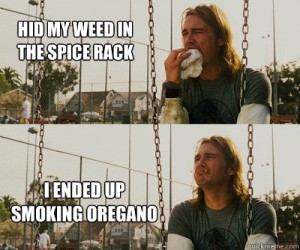There’s lots of stories about food safety miracle spices and cures, but often in the absence of valid verification.
So the New York Times decided to further erode its scientific credibility by running a story about Bell & Evans, a Pennsylvania poultry producer that feeds chickens a specially milled diet laced with oregano oil and a touch of cinnamon.
Scott Sechler swears by the concoction as a way to fight off bacterial diseases that plague meat and poultry producers without  resorting to antibiotics, which some experts say can be detrimental to the humans who eat the meat.
resorting to antibiotics, which some experts say can be detrimental to the humans who eat the meat.
Skeptics of herbal medicines abound, as any quick Internet search demonstrates. “Oil of oregano is a perennial one, advertised as a cure for just about everything,” said Scott Gavura, a pharmacist in Toronto who writes for the Web site Science-Based Medicine. “But there isn’t any evidence, there are too many unanswered questions and the only proponents for it are the ones producing it.”
The oregano oil product Mr. Sechler uses, By-O-Reg Plus, is made by a Dutch company, Ropapharm International. In the late 1990s, Bayer conducted trials on the product, known as Ropadiar in Europe, comparing its ability to control diarrhea in piglets caused by E. coli with that of four of the company’s products.
In all four test groups, Ropadiar outperformed the Bayer products. “Strange but true!” Dr. Lucio Nisoli, the Bayer product manager, wrote in his report on the trial. “Compared to the various anti-infectives, with Ropadiar I have obtained much more effective and quicker results. Furthermore, piglets treated with Ropadiar look much more healthy and were not so dehydrated and wasted.”
Astrid Köhler, a spokeswoman in Monheim, Germany, for Bayer Healthcare’s animal health business, confirmed that the company had done the trial but said that “in further evaluations the results of the first study could not be replicated with the same species, nor with other species.”
Other testing is rare. A test of oregano oil on four small farms in Maine, which was financed by a $9,914 grant from the Agriculture Department, found it was effective in controlling the parasites and worms that afflict goats and sheep.
After a chicken flock leaves a barn at Bell & Evans for slaughter, for instance, the facility is hosed down, its water lines are cleaned out and everything is disinfected. It sits empty for two to three weeks to allow bacteria to die off and to ensure that the rodents that carry salmonella and campylobacter are eliminated.
“You can’t just replace antibiotics with oregano oil and expect it to work,” Mr. Sechler said.
